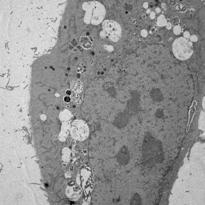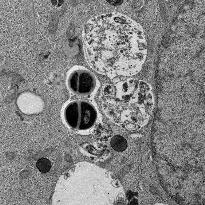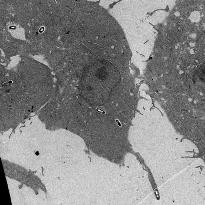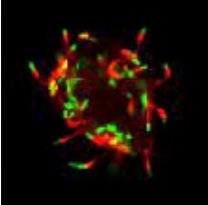Welcome to Our Homepage!
Department of Microbiology and Immunology
Department of Biopolymers and Health Science
Infectious diseases cause great suffering not only to the patients themselves, but also to those around them, including medical professionals, because pathogens spread over a wide area. In particular, the emergence of new infectious diseases and drug-resistant microorganisms poses a therapeutic challenge. In the Department of Microbiology and Immunology, we have been conducting research on both perspectives of infection mechanisms and host immune responses with the aim of preventing infectious diseases.
Currently, we are focusing on pathogen-pathogen and pathogen-host interactions mediated by secretory proteins and extracellular vesicles (EVs). EVs released from microorganisms contain biologically active compounds such as nucleic acids, proteins and lipids within their enclosed membrane structure, making them suitable for directly delivering virulence factors to host cells or transmitting information to other pathogens to promote pathogenicity. In particular, the mechanism by which co-infection of multiple pathogenic bacteria can exacerbate disease remains unclear, but we are currently conducting research on the relationship between EV-mediated bacterial communication and pathogenicity. Elucidation of complex pathogen-pathogen and pathogen-host interactions mediated by mediators such as EVs is expected to provide new strategies for the prevention and treatment of infectious diseases.1.Elucidation of the mechanism of Listeria infection and development of a vaccine
Listeria is an intracellular parasitic bacterium that can evade host immunity and causes meningoencephalitis and sepsis in humans. We have analyzed the infection mechanism and host immune response using L. monocytogenes as a model, and have reported research results on its virulence factors, immune response, host immune evasion, and next-generation vaccine development.
-
2.Research on Staphylococcus aureus infection, toxins and EVs
S. aureus is a major cause of nosocomial infections, and in particular methicillin-resistant strains (MRSA) are a problem in the treatment of infectious diseases worldwide. This bacterium has mechanisms to survive in various environments within its host. At the same time, this bacterium is known to produce multiple virulence factors, such as adhesins, invasins, and hemolysins, causing opportunistic infections. Our group has studied toxic shock syndrome toxin 1 (TSST-1) and food poisoning-causing staphylococcal enterotoxins to investigate their novel functional activities, mechanisms and potential as vaccines. Currently, we are focusing on EVs produced by this bacterium. Since S. aureus is commonly found on the surfaces of human skin and the nasal cavity, EVs released from S. aureus are thought to directly affect the host. We are identifying virulence factors in S. aureus -derived EVs and analyzing their effects on the host immune response.
-
3. Research on interactions between different bacteria via EVs
The full extent of the complex interactions between co-existing bacteria has not been elucidated, but the interactions between different bacteria mediated by EVs have recently attracted attention. We focus on S. aureus and Pseudomonas aeruginosa, which are often co-infected, and study their EV-mediated interactions. P. aeruginosa commonly coexists with S. aureus in chronic wounds, but their antagonistic and symbiotic relationship is unclear. We are currently preparing EVs from each bacterium and analyzing their effects on bacterial growth and pathogenicity. In the future, we plan to elucidate the detailed mechanisms of these EV-mediated interactions and their competitive advantage during coinfection. In addition, we are studying the function of EVs in biofilm formation by these bacteria.
-
4. Pathogenicity of opportunistic pathogens under hypoxic environments and their interactions with the host
Opportunistic pathogens can survive under various environments in the human body and cause a variety of infectious diseases when host defenses are weakened, such as the weakened immune system. Our research focuses on the adaptation of opportunistic pathogens to hypoxic environments their mechanisms behind the development of infectious diseases. We have found that the opportunistic pathogenic yeast, Candida albicans, alters its secretome under hypoxic environments to modulate the host immune response. In addition, we have reported that Acinetobacter baumannii, a pathogenic bacterium that is problematic in hospital-acquired infections, alters the protein profile of EVs under hypoxic condition, and this alteration may be involved in their interaction with the host. The relationship of this alteration with host immune response, cytotoxicity, and infection mechanism is currently being analyzed.
-
5.Involvement of natural biopolymers in microbiota and host immunity
Many indigenous microorganisms in the human body form a microbiota, and its balance plays an important role in host immunity. In recent years, it has become clear that disruptions to the microbiota are associated with various diseases, including allergies, autoimmune diseases and cancer. By using various mouse models, we have reported that the ingestion of natural biopolymer products such as salmon cartilage proteoglycan promotes health through the improvement of the intestinal microbiota and host immunity.
-
6. Antibacterial and antiviral effects of Aomori Indigo Extract
The components contained in "Aomori Indigo Extract" extracted by AOMORI AI & Co. have inhibitory effects against pathogens including bacteria and viruses. We are conducting research on its active ingredients and effects in an industry-academia collaboration.




